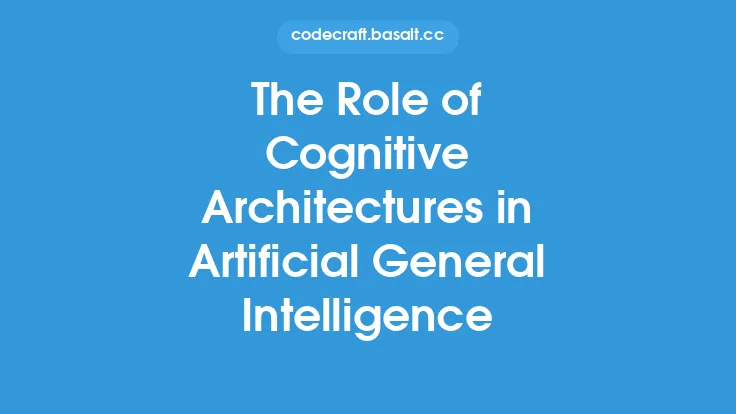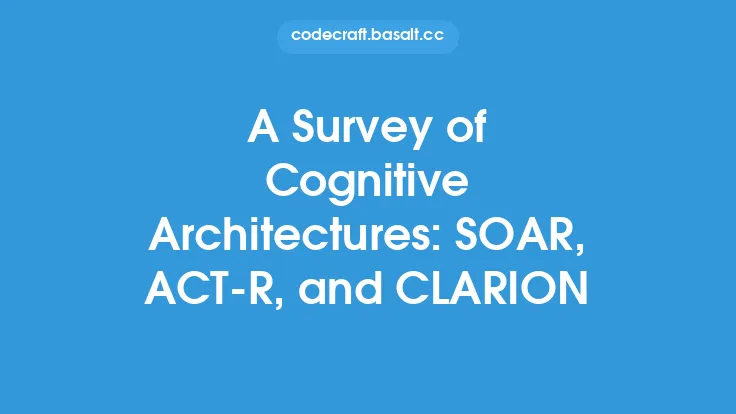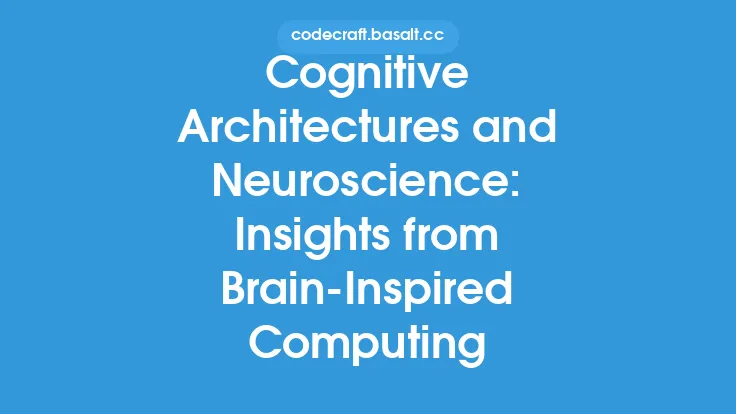The field of cognitive architectures has undergone significant transformations in recent years, driven by advances in artificial intelligence, neuroscience, and computer science. As researchers and developers continue to push the boundaries of what is possible, the future of cognitive architectures holds tremendous promise for innovation and discovery. In this article, we will explore the trends, challenges, and opportunities that are shaping the future of cognitive architectures, and examine the key factors that will influence their development and application.
Trends in Cognitive Architectures
Several trends are currently shaping the field of cognitive architectures, including the increasing use of machine learning and deep learning techniques, the development of more sophisticated and realistic models of human cognition, and the growing importance of explainability and transparency in cognitive architectures. Another significant trend is the integration of cognitive architectures with other AI technologies, such as natural language processing and computer vision, to create more comprehensive and capable systems. Additionally, there is a growing interest in the development of cognitive architectures that can learn and adapt in real-time, and that can be applied to a wide range of domains and applications.
Challenges in Cognitive Architectures
Despite the many advances that have been made in cognitive architectures, there are still several challenges that must be addressed in order to realize their full potential. One of the major challenges is the need for more robust and scalable architectures that can handle complex and dynamic environments. Another challenge is the requirement for more sophisticated and realistic models of human cognition, which can capture the full range of human cognitive abilities and behaviors. Additionally, there is a need for more effective and efficient methods for integrating multiple knowledge sources and for reasoning and decision-making under uncertainty. Furthermore, the development of cognitive architectures that can learn and adapt in real-time, and that can be applied to a wide range of domains and applications, is a significant challenge that requires advances in areas such as machine learning, optimization, and control.
Opportunities in Cognitive Architectures
The future of cognitive architectures holds tremendous opportunities for innovation and discovery, and is likely to have a significant impact on a wide range of fields and applications. One of the most significant opportunities is the potential for cognitive architectures to enable the development of more advanced and capable AI systems, which can learn, reason, and interact with humans in a more natural and intuitive way. Another opportunity is the potential for cognitive architectures to improve our understanding of human cognition and behavior, and to provide new insights into the mechanisms and processes that underlie human thought and action. Additionally, cognitive architectures have the potential to enable the development of more effective and efficient systems for decision-making and problem-solving, and to provide new tools and methods for a wide range of applications, including education, healthcare, and finance.
Technical Advances in Cognitive Architectures
Several technical advances are currently being explored in the field of cognitive architectures, including the use of neural networks and deep learning techniques, the development of more sophisticated and realistic models of human cognition, and the integration of cognitive architectures with other AI technologies. One of the most significant technical advances is the use of cognitive neural networks, which are designed to mimic the structure and function of the human brain. These networks have the potential to enable the development of more advanced and capable AI systems, which can learn and reason in a more human-like way. Another technical advance is the development of more sophisticated and realistic models of human cognition, which can capture the full range of human cognitive abilities and behaviors. These models have the potential to provide new insights into the mechanisms and processes that underlie human thought and action, and to enable the development of more effective and efficient systems for decision-making and problem-solving.
Applications of Cognitive Architectures
Cognitive architectures have a wide range of potential applications, including education, healthcare, finance, and transportation. In education, cognitive architectures can be used to develop more effective and efficient systems for learning and instruction, which can adapt to the needs and abilities of individual students. In healthcare, cognitive architectures can be used to develop more advanced and capable systems for diagnosis and treatment, which can learn from experience and adapt to new situations. In finance, cognitive architectures can be used to develop more effective and efficient systems for decision-making and risk management, which can learn from experience and adapt to changing market conditions. In transportation, cognitive architectures can be used to develop more advanced and capable systems for control and navigation, which can learn from experience and adapt to new situations.
Conclusion
The future of cognitive architectures holds tremendous promise for innovation and discovery, and is likely to have a significant impact on a wide range of fields and applications. As researchers and developers continue to push the boundaries of what is possible, we can expect to see significant advances in areas such as machine learning, optimization, and control. Additionally, the integration of cognitive architectures with other AI technologies, such as natural language processing and computer vision, is likely to enable the development of more comprehensive and capable systems. However, there are also significant challenges that must be addressed, including the need for more robust and scalable architectures, and the requirement for more sophisticated and realistic models of human cognition. Despite these challenges, the opportunities presented by cognitive architectures are significant, and are likely to have a major impact on the future of artificial intelligence and beyond.





